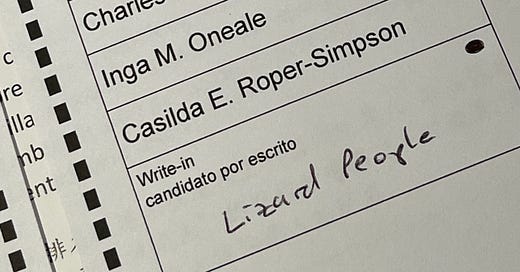We had a primary election in New York yesterday—you may have heard! A few day-after thoughts:
For months, Andrew Yang dominated the media coverage of the race. I contributed to that discussion in my small way, though I was never a member of the Yang Gang (nor was I ever one of his odiators who thought he would be a uniquely disastrous mayor). In the end, he came in a distant fourth, and has already conceded the race.
So did he ultimately even matter? I’m not sure. I could say that he established this as a change election, and demonstrated a willingness on the part of voters to look beyond the most-known political quantities to get the change they seek. I could say that he highlighted the central importance of economic recovery from the pandemic, and the crucial role of business and tourism in bringing that recovery about, in a way that might have put the left on its back foot. I could say that by sucking up all the oxygen for months, he made it possible for someone like Adams to seem fresh, and to avoid the kind of close scrutiny that might otherwise have undone him.
But I’m not sure any of that is true. At his peak, Yang was polling in the low to mid 20s, while most voters were still undecided. In retrospect, it’s not clear how much that support ever meant. Meanwhile, if Yang had never been in the race, Adams would probably have pursued the same campaign strategy that he did, pulling together a coalition of the Black vote, the outer-borough homeowner vote, and a big chunk of business community, and highlighting his opposition to defunding the police. Wiley would likely still have been in the best position to consolidate the progressive vote, and Garcia would likely still have been a better foil for Adams than Stringer.
Although the timing of his entry was very different, then, in many ways Yang’s effect on the NYC mayoral primary is probably similar to Bloomberg’s effect on the 2020 Democratic presidential primary. By joining the fray, he did establish that the race could be radically destabilized. But in the end, if he had any impact at all, it was to facilitate a victory by the guy who was most likely to win from the beginning anyway.
Did Adams win, though? Not quite yet, but I very much hope he does at this point. Ranked-choice voting is still a very new thing, and I think there will be a lot of confusion, anger and resentment if its first result is to deliver a come-from-behind squeaker victory for someone who lagged by ten points or more on the first ballot. I’m glad that Adams hasn’t declared victory, which would be a very destructive move, but that’s partly an expression of confidence. I do not want to see what happens if that confidence evaporates as we start counting second, third and subsequent choices.
So could Wiley or Garcia still pull it out? It’s possible—but unlikely. Either would need more than 60% of the second-place votes from the entire rest of the field (including whichever of them winds up in third), which is a tall order. Yes, Yang told his Gang to vote Garcia second, but how many will listen? Some of Yang’s best voters—like the Orthodox Jews of Borough Park—have longstanding relationships with Adams, while others might well have been motivated by the same concerns about defunding the police that Adams highlighted. Some of the other candidates also seem likely to throw subsequent-round votes Adams’s way. In particular, Ray McGuire—a Black Wall Street veteran who came from humble origins—drew his limited support from the same base that Adams dominated; neither Wiley nor Garcia can take his votes for granted. And while it’s easy to see why voters in Park Slope or the Upper West Side might have ranked both Garcia and Wiley above Adams on their ballots, there will certainly be Garcia voters in Riverdale or Staten Island who would prefer a fellow moderate, and Wiley voters in Harlem or Crown Heights who would prefer a Black mayor.
I’m also curious to see how ranked-choice voting winds up affecting other races. However the mayor’s race ends, on the first ballot the more moderate candidates—Adams, Garcia, Yang, McGuire—between them won over 65% of the vote. In that context, it’s unsurprising to find Adams the heavy favorite to win when all the counting is done. But in the City Comptroller’s race, progressive Brad Lander is the leader on the first round, with a total fairly comparable to Adams’s. Does that mean he’s similarly a heavy favorite to win in the end? It depends what happens when the votes of more moderate candidates like Michelle Caruso-Cabrera, David Weprin and Zach Iscol are allocated, who between them won more votes than the second-place finisher in the first round, Corey Johnson.
Part of the appeal of ranked-choice voting is precisely that it’s supposed to reveal who truly has majority support, rather than mere plurality enthusiasm. If Adams and Lander both wind up winning by healthy margins, one thing that will be revealed is that New York Democrats don’t vote in a strictly ideological manner, nor according to the dictates of identity politics. That would be a healthy fact if true, and a useful thing to know. And with the biggest worry about Adams being the possibility of old-time machine corruption making a comeback, it might be a good idea to have an honest, earnest, dyed-in-the-wool progressive in charge of auditing his administration.




